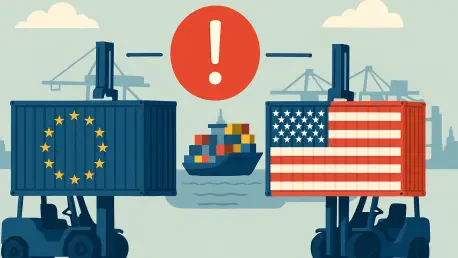In a significant move that underscores the delicate balance of transatlantic trade relations, the European Union has once again postponed its planned retaliatory tariffs on American goods by an additional six months. This marks the third such delay, reflecting a persistent strategy of diplomacy over confrontation amid ongoing trade tensions with the United States. The decision follows a framework agreement aimed at cooling hostilities, highlighting a mutual desire to avoid a full-scale trade war that could disrupt both economies. With billions of dollars in goods and investments at stake, this pause offers a window for further negotiations, while signaling a cautious optimism about finding common ground. The intricacies of this development reveal not only the complexities of global trade dynamics but also the shared recognition that escalation could have far-reaching consequences for businesses and consumers on both sides of the Atlantic.
Navigating Trade Tensions
A Pattern of Strategic Delays
The European Union’s choice to delay countermeasures yet again speaks to a broader trend of calculated patience in addressing trade disputes with the United States. Initially poised to impose levies of up to 30% on a wide array of American products, the EU has repeatedly pushed back its timeline, prioritizing dialogue over immediate retaliation. This approach stems from a deep understanding of the potential economic fallout that could ripple through industries ranging from agriculture to manufacturing. Announced by a spokesperson for the European Commission, the latest postponement aligns with earlier delays that targeted billions in U.S. imports, demonstrating a consistent policy of restraint. The rationale behind this strategy is clear: a trade war would likely harm both blocs, disrupting supply chains and increasing costs for consumers at a time when global economic stability is already under strain. This measured stance reflects a commitment to preserving long-term economic ties while navigating short-term political pressures.
Framework for De-escalation
A pivotal element of this delay is the recent framework agreement reached between EU and U.S. leaders, which has provided a foundation for reducing trade friction. High-level discussions have resulted in commitments from the U.S. to lower planned tariffs on EU imports from a steep 30% to a more manageable 15%, a move reciprocated by the EU’s pause on countermeasures. Additionally, the EU has pledged significant investments in the American economy and substantial purchases of U.S. energy exports, signaling a willingness to deepen economic cooperation. While specifics of the deal remain under negotiation, as noted by European Commission officials, this preliminary accord represents a critical step toward averting a deeper conflict. The mutual adjustments underscore a shared recognition that collaboration, rather than confrontation, offers the most viable path forward. However, the unresolved details highlight the fragility of this truce, with both sides needing to finalize terms to ensure lasting stability in trade relations.
Implications for Transatlantic Relations
Balancing National Interests with Cooperation
The repeated delays in imposing tariffs reveal a nuanced balancing act between protecting national interests and fostering transatlantic cooperation. On one hand, the EU’s initial readiness to levy substantial tariffs on American goods demonstrated a firm stance against perceived unfair trade practices, safeguarding domestic industries from potential harm. On the other hand, the decision to pause these measures illustrates a pragmatic acknowledgment of the interconnected nature of the two economies. A tit-for-tat escalation could lead to significant economic disruption, affecting everything from job markets to consumer prices. This duality is mirrored in the U.S. response, which combines a tough trade policy with openness to dialogue through tariff reductions. The framework agreement, while not fully finalized, serves as a testament to the potential for compromise, even as both parties grapple with domestic demands for protective measures. This delicate dance of policy and politics continues to shape the trajectory of trade relations.
Looking Ahead to Stability
As the EU and U.S. work through the remaining details of their framework deal, the focus remains on achieving long-term stability in transatlantic trade. The mutual commitments to reduced tariffs and economic engagements, such as energy exports and investments, lay the groundwork for a partnership that could mitigate the risks of future disputes. However, uncertainties persist, with European Commission leaders emphasizing that the specifics of the agreement still require careful negotiation. The objective reality is that neither side can afford the fallout of a prolonged trade conflict, especially given broader global economic challenges. This latest delay, therefore, serves as a critical juncture, offering a chance to build on the progress made and address lingering issues. Looking back, the structured approach to de-escalation that unfolded over recent months provides a hopeful glimpse of sustained collaboration. Moving forward, both parties must seize this opportunity to cement their fragile truce into a robust framework for mutual benefit.









